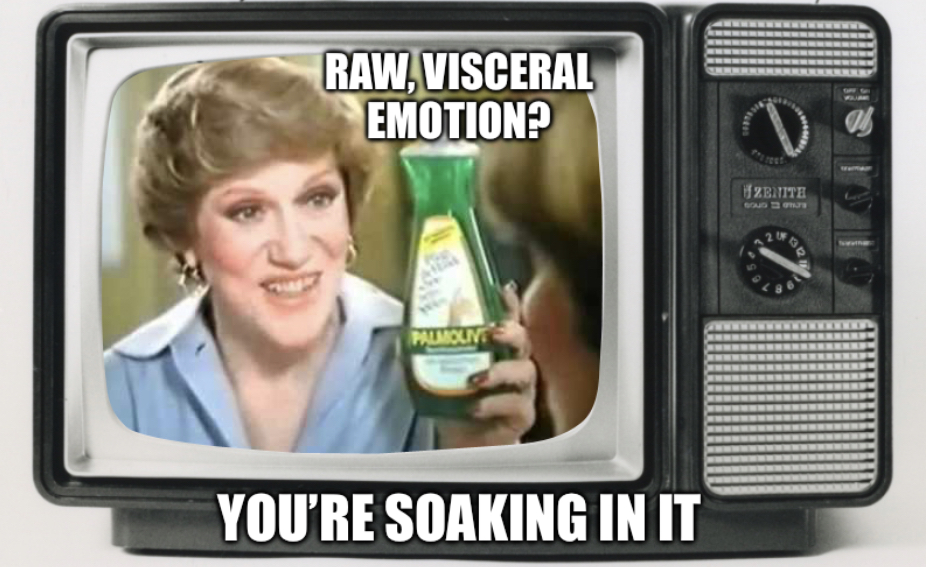When you’ve just discovered your partner has been lying to you about their porn or sex addiction – this discovery is often called “d-day” – you’re likely to feel intensely hurt, angry, or sad. These extremely raw feelings can be tough to regulate in the moment. I remember, especially in the first six to nine months after d-day, that these feelings would flare up like a wildfire, and they often felt equally hard to contain. Sometimes I was in such high emotion that I felt crazy.
It doesn’t happen as often for me now that I have some healing under my belt and the passage of time has done its thing. I’ve built out a kit with a number of self-soothing tools to enable me to move through the burning flames of my most intense feelings to a place closer to my center, and I’d like to share some of those tools with you for when your feelings are most raw and painful.
Remember that the intensity of these feelings is temporary.
Remind yourself of this every time the feelings start spinning up. Every. Time. Remind yourself as often as you need to. Make it your mantra and say it out loud if you need to:
This is temporary. I will not always feel this intensely. This pain will not always feel this raw.
In the moment’s intensity, this may not feel true, but I promise you, it is. All things and feelings, good or bad, are temporary. If you let them pass in their own time, they will.
You will not always feel as profoundly and keenly pained as you do in this moment. The feeling will subside. It may not go away entirely, but it will not always feel this terrible, this paralyzing, as it does when it’s most intense. Pinky promise.
Ground yourself in the present moment
The most intense feelings from my betrayal trauma are often rooted in the past or the future, but usually not in the present moment. I get triggered thinking about my husband’s past behaviors and feel intense anger or sadness. Or I get caught up in fears about the future – what if he does it to me again? What if I find out he’s hiding it better and lying about it again? What if, what if, what if…
By rooting myself in the present moment, I turn away from the unchangeable past and the unknowable future, and I focus on what I can do for myself right here, right now, in the present moment.
Returning to the present moment doesn’t wipe away my feelings and make things A-OK immediately. I still feel the feelings, but the intensity sometimes comes down when I bring myself back to the present, and that often gives me the space to figure out what I need to do next.
There are myriad ways of grounding yourself in the present moment. I’ve listed a few I like to use below.
Meditation
I’ve been Buddhish for almost twenty years, so when my therapist recommended I re-engage with meditation, it was a familiar place.
Meditation has been a hot topic in the mainstream for many years and can be used to address emotional distress. If you have a vision of hours of cross-legged sitting humming “Om,” think again. A meditation practice doesn’t have to be that much of a thing.
When I’m in high distress, I prefer guided meditations. Sometimes I like to find a reflection to address the particular emotion I’m feeling – anger, for instance. Other times, a self-compassion meditation fits the bill.
If you have trouble meditating with your eyes closed or following your breath or the guiding voice in a guided meditation, try lighting a candle and placing it before you. Focus your attention on the flickering candle flame to keep you engaged with your meditation.
Even 60 seconds of focus on your breath, the soft voice of a compassionate meditation guide, or another object of focus can bring you back to the present moment and to a place where you can begin moving through the intensity of your feelings.
I have enjoyed using Headspace for meditation and Calm for sleep stories and immersive sounds while I’m meditating. My favorite meditation app – loaded with tons of free content from meditation thought leaders – is Insight Timer.
Other grounding exercises
Try these shorter exercises if launching a meditation practice feels like too much commitment.
Literal grounding
Close your eyes. Notice your body where you are sitting or lying. Notice every point where a part of your body touches something else (your hand resting on your leg, your bottom pressed into the chair’s cushion). Scan your body and the physical sensations you’re experiencing: the warmth in your cheeks from your heightened emotions, your quickened heartbeat, the feelings of your breath in and out of your nose, the sensations of your body in contact with furniture or the floor. Place your feet on the floor and feel them connecting with the ground if possible. You’re literally grounding yourself here, as if your feet are the roots of a great tree, rooted in the physical present. Stay in this moment, grounded and present, as long as you need to.
Grounding yourself with your senses
Notice your space. Find and name five things you can see, four things you can hear, three things you can feel, two things you can smell, and one thing you can taste. The combination of counting and finding things brings me sharply back into the present moment.
Another exercise I like is to close my eyes and listen, then name all the different sounds I can hear. Right now, I can hear the whoosh of the furnace fan, my husband clicking on a spreadsheet he’s working on for work, and the sounds of my keystrokes as I write this. My dog is snoring. I am aware of what is happening in the space I inhabit. I am fully present in my physical space, and my emotional state is more manageable when I am entirely in the present moment.
Take care of yourself
Self-care can take many forms, and what you find helpful depends on what makes you feel calm, safe, and content.
Self-compassion
Despite what I just said about self-care being variable, self-compassion is a universal need. Every person is worthy of feeling self-compassion.
People who are hurting need to express self-compassion and kindness toward themselves. Practicing being gentle with yourself when you are in pain is a critical skill to refine as you learn to bring yourself back to a center where you feel comfortable with yourself and your feelings. This will give you the power of self-validation, an invaluable tool in centering yourself regardless of what your significant other does or doesn’t do.
When you feel shitty or crazy or heartbroken or full of rage or any other raw, intense emotion because of your partner’s porn addiction behaviors and lies, treat yourself as kindly as you would a beloved friend or family member experiencing the same feelings of betrayal.
If someone you loved was experiencing the feelings you’re feeling right now, you wouldn’t tell them to suck it up, get over it, or brush it to the side and carry on. You would let that loved person cry on your shoulder and vent their feelings. You would hug them (or hold them tenderly in your thoughts if they’re not the hugging type). You would hear them and validate their feelings and offer them comfort.
Do the same things for yourself. You may not love yourself as much as you love your beloved friend or family member, but try. You are worthy of self-love. You are worthy of gentle kindness when you’re feeling difficult feelings. Hold space for yourself. Be compassionate toward yourself.
Kristin Neff is an expert on cultivating self-compassion in an unforgiving world. I strongly recommend her book, Self-Compassion: The Proven Power of Being Kind to Yourself,” if you’d like to explore more about building your self-compassion skill.
Feel your feelings
This is another universal one. I think it’s a human impulse to want to run away from unpleasant feelings or to brush them aside and hope they’ll go away if they’re out of sight.
Resist this urge.

Soak in it. Sit in that feeling. Sit with it. Let it be what it’s going to be, for as long as it needs to be. Create room for it. Acknowledge the feeling – identify it and figure out where it came from, if possible – but even if you can’t figure out where it’s coming from, accept that the feeling is with you, and then embrace it if you can.
I envision a little room in my heart where this Feeling can hang out while it sorts itself out. My visualization includes a comfy little chair for the Feeling and a side table where it sets its teacup. The Feeling may also have access to a little ottoman so it can put up its feet if needed, and a rug to really tie the room together.

Don’t worry – the Feeling won’t move in permanently if you create space for it. I was always afraid that it would stay forever if I let it make itself too much at home, but I have found that these challenging feelings actually go away faster if I create a space for them and let them run their course than if I try to brush them aside and pretend that I’m feeling OK.
I have discovered that if I let the feeling be what it is for as long as it needs to, it usually only takes a couple of days to resolve and vacate – on its own. When I was more in the habit of brushing away uncomfortable feelings, it sometimes seemed like the feeling had gone away, but it would then rush up later at unexpected times, having been simmering away inside me unresolved, festering and growing larger and messier than it was in the first place.
Trust me, feel the feelings. Accept them. Visualize riding a wave as the feelings wash over you. Keep your head above water with meditation, self-care, and the tactics below, but don’t try to outswim the pain. Stay with it; let it be what it needs to be. After decades of unsuccessfully rug-sweeping my uncomfortable feelings, I promise this is the better way.

Process the feelings
It may be helpful for you to start processing the feelings as you’re feeling them.
Identify and name what you’re feeling.
A feelings wheel can help you narrow down the nuances of what you’re feeling. Did you know that anger is usually a secondary emotion?

Identify what caused the feeling to arise in you.
Did your partner say something insensitive? Is your partner not making you feel heard? Did you trigger yourself with a thought from the past?
Once you’ve identified what you’re feeling, try to figure out what stirred up the emotion you’re experiencing. What will help you address the root cause of these complicated feelings? Consider what you can do to help soothe these feelings and what steps you can take to tend to the problem that created these emotions in you.
Journal
I’ve kept a journal, off and on, for decades. I have a terrible memory, so writing things down helps me keep an accurate record of what has happened. Tracking disagreements can be helpful if your partner is prone to gaslighting you. Writing about what I’m feeling can help me identify the why and what my next steps to take care of myself should be. Keeping a journal enables me to reread how I moved through previous intense emotional situations and gives me an anchor when I’m feeling raw and crazy. Even intermittently, I’ve found keeping a journal exceptionally helpful in my journey beyond d-day.
Spend time with someone you trust
I didn’t have friends when I discovered my husband had lied to me for our entire relationship. I had turned all my attention inward to my husband and kids, and hadn’t maintained friendships. I felt utterly alone on d-day and for several months afterward until I could build a network of friendly people as my external support system.
If you don’t have people you trust, start building that network. I made mine by joining private groups run by local Certified Sex Addiction Therapists (CSATs). I grew very close to some of the other women in those groups and am friends with them now. Until I grew those friendships, my CSAT, whom I saw individually, helped me process some of my most uncomfortable emotions.
If you have friends and family you can share your emotional distress with, know that you don’t have to tell them everything that is happening to ask for comfort. If you don’t feel comfortable sharing that your partner is a porn addict or sex addict, that’s OK. You can express the feelings you’re having and ask for comfort, an ear, or whatever it is you want them to provide. You don’t have to go into detail if you don’t wish to. What you disclose and to whom is entirely up to you.
In the US, if you feel suicidal, you can text or call 988 to access the Suicide and Crisis Lifeline. It’s open 24 hours and it’s free. Here’s what to expect when you call a hotline.
Distract yourself
If you aren’t ready to process your feelings and they’re too intense to sit with, distract yourself, preferably with something pleasant that doesn’t tax you. This is where self-care gets quite specific and individual. Here are some ideas that have worked for me in the past.
- Take a bath – A long soak with luxurious bubbles, a candle, and a book, podcast, or show often helps me feel more relaxed and together.
- Play a game – Immersing myself in Animal Crossing or a Pokemon game sometimes helps me feel more chill.
- Binge a show – Two or five episodes of a gripping show can sometimes help knock down the intensity of a feeling.
- Take a walk or have a workout – Exercise increases the levels of happy chemicals in your brain, including serotonin, dopamine, and norepinephrine. Plus, you get the stress-reducing benefits of endorphins (and Vitamin D if you walk outside – wear sunscreen, though!).
- Put on some loud music and dance it out See above.
- Meditate or do some mindfulness exercises – Also see above.
- Be creative – If you have a hobby, throwing yourself into a project can take your mind off the intensity of your distress.
- Throw ice cubes – Yeah, seriously. Take a cupful of ice cubes outside and smash them on the pavement (out of walkways or other places smashed ice could be problematic). Sometimes when you’re angry, it feels good to break something.
- Go out with friends – Have a date with yourself and your besties.
- Go out by yourself – Take yourself on a date. You are your own best company!
- Do anything you like when you’re not in distress– Bonus points if it is healthy and non-self-destructive. For example, you can be forgiven for drinking about your feelings, but ultimately, getting drunk about a problem isn’t going to fix it and may make you feel worse about it. To the extent possible, distract yourself in non-toxic ways – it’s kinder to yourself. But if your cope isn’t exactly healthy, try not to give yourself too hard a time about it. This shit is hard, and you’re in the thick of it. See above about self-compassion.
So, in summary, when you’re feeling so crazy you wanna tear your hair out, so angry that you want to punch a hole in the wall, or so sad that you just want to curl into a little ball and stop existing, first remind yourself that the intensity of these feelings is temporary. Try to stay in the present moment, experience the emotion as fully as you can tolerate, and be gentle with yourself until the intensity of the feeling has dimmed enough for you to manage it. Ride the wave each time the challenging feeling swells up. The seas will calm, and you will be in a better place to figure out what to do next. You got this.